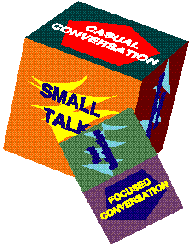Has your sales floor become a parlor for conversation or a place for focused selling where both the salesperson and customer benefit?

Recently, while going over some French vocabulary, I came across the word PARLOIR (parlor); a place in which people casually talk. I immediately thought that parlor might well define how furniture sales floors too often end up, a place where salesperson and customer carry on a casual rather than a focused conversation.
In the video introduction to its latest version of Professional Selling Skills (PSS), Learning International, Inc. likens selling to a road trip the salesperson and the customer take together. On that trip, the customer is the pilot and the salesperson is the navigator. The former decides where to go; the latter does the guiding. The travelers, then, are not two people who happen to be seated together as passengers, each with a different destination. Instead, the road trip taken by customer and salesperson ought to be viewed as one in which, let us say, a free lance photographer hires a guide to drive her through the African Serengeti to sites that can provide her with the most intriguing shots. Note the mutual dependency of the photographer and her hired guide. She agrees to pay him for his guidance provided that guide meets her needs. In a nut shell we see encapsulated the heart and soul of the way Learning International, Inc. defines PSS: Need Satisfaction Selling. Whose need? that of customer and salesperson both. It may be the only selling skill system to define the good of the salesperson as helping the customer to make an informed mutually beneficial decision.
There are two things our free lance photographer demands of her guide:
-
That he know the Serengeti (product knowledge) like the back of his hand and..
-
That he take her to the sites, and only the sites, which match her needs.
The guide must not only be especially knowledgeable of the Serengeti; he must also be an especially good listener as he pays attention to the responses to his skilled questioning (probing). She does not depend on her guide for the quality of her photographic equipment or her photographic skills. While she depends on his keen knowledge of the Serengeti, she is insistent that he must not give her a tour of the entire Serengeti. She has neither the time nor the money to waste. The guide is to take her only to those sites that are in keeping with what she has described as meeting her needs (supporting). In short, while the Serengeti (the furniture floor) has many choices, she will do the choosing based on the selective choices he gives her.
Like that free lance photographer, our customers too are in need of professional guidance (consultative selling). Our customers are willing to compensate those salespeople who know their 'Serengeti' best described by John F. Lawhon as the 'Five Groups of Knowledge'. But they need a salesperson who in addition to having specialized knowledge, has professional selling skills. Salespeople with specialized knowledge alone are apt to take the customer all over the 'Serengeti'. Customers don't want a guide to take them on some pre-arranged tour which they follow and listen like passive tourists. Our customers enter our stores on business. True, they don't mind some introductory small talk provided the tail doesn't wag the dog, so to speak. True, they appreciate gracious, kind salespeople. None of that, however, will end up pleasing our customers if their salesperson lacks the skills to lead them to a successful buying decision. For just as our photographer will ask her guide to turn around and take her back if she senses he is merely wasting her time, so too our customer will not hesitate to let unskilled salespeople know that they do not want to continue to work with them. They may do this politely with expressions like, "I'm sure I'll be back. Would you please write this information on your card. I'll be sure to ask for you." Too many salespeople at that point fail to realize that they have been politely fired as surely as the guide on the serengeti.
The inimitable Yogi Berra once quipped: "If you don't know where you are going, how will you know when you get there?" While I agree that Yogi's quips are best left without comment, nevertheless I'll make an exception and comment on Yogi's above stated oxymoron.
First, if salespeople don't know where they're going, they probably won't get there. Second, if when their unmapped direction somehow gets them to stumble on the right road, they won't stumble on it with any kind of consistency. There, those salespeople who occasionally stumble on the right road are generally the same ones who are convinced that it was the luck of the up. "Give me a good customer," Lawhon heard again and again from those weak salespeople he interviewed, "and I'll sell them every time," proving by that reply that they simply didn't get it.
In conclusion, the sales conversation must be focused if it is to be successful. In other words, the sales floor is not to become a parlor, that is, a place for casual conversation. Nothing I know of is better equipped to help the salesperson maintain a focused conversation with customers than the four selling skills taught in Learning International, Inc.'s sales seminar. Those four skills are opening, probing, supporting, and closing.
In the next issue we'll take a close look at the first of those skills, the opening.
Corporate trainer, educator and speaker Dr. Peter A. Marino has written extensively on sales training techniques and their furniture retailing applications. Questions on any aspect of sales education can be sent to FURNITURE WORLD at pmarino@furninfo.com.